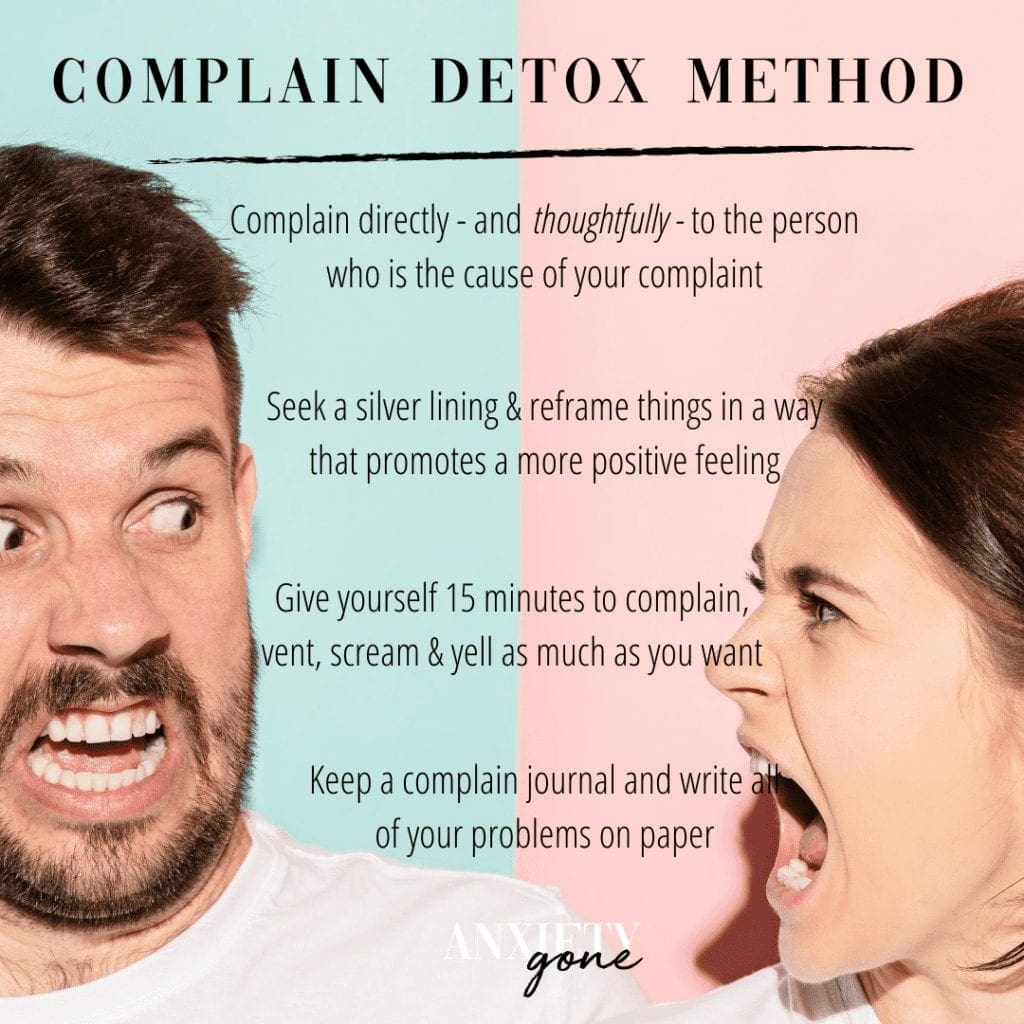Full Disclosure: Clicking on these links could mean a tiny commission for me, at no extra cost to you.
Let’s talk about complaining. We all do it and there’s nothing wrong with letting off some steam. This is particularly true since you shouldn’t hold in how you’re feeling. However, it’s important to avoid making complaining a habit because chronic complaining drastically affects your mental health. It can increase your stress levels, add to your anxiety, push your loved ones away, and that’s only to name a few of the ways complaining affects your mental health.
Ways Complaining Affects your Mental Health
Complaining feels good at first, right? It provides some sense of relief, but it’s all a placebo. In other words, you think complaining feels good but in reality, it is doing much more harm than good. When you complain regularly, it has a plethora of negative impacts on your mental health and life, as a whole.
Seeping Negativity Into Society
Let’s start with one of the ways complaining affects your mental health that I feel is utmost important. By complaining, we become the cancer we’re complaining about as the negative influence seeps into society. Think about it: you’re driving to work, someone cuts you off and yells at you. Then, you go to work and tell your co-workers about the person yelling at you on the road. Now these people feel the impact of the yelling and get upset about it too. This then has a trickle affect. These people continue with their day, perhaps being agitated or short with those around them because of the way your traffic squabble made them feel. In this world, especially now, we need to be sharing and encouraging positivity and learning how to stop complaining is a great way to avoid spreading negativity.
Chronic Complaining is An Unhealthy Coping Mechanism
As mental health warriors, it’s imperative to have healthy coping mechanisms – chronic complaining is not one of them. Now, everyone complains and doing so occasionally is okay. However, when it becomes your go-to coping mechanism, the complaining affects your mental health in many ways.
To put it into perspective, complaining typically involves negativity, which is used as a false means of controlling a situation. Chronic complainers often use this mechanism to prepared themselves for disappointment, when in reality, they are disappointed to begin with. So, you’re just prolonging your feelings of disappointment and negativity by complaining as you’re carrying out the situation.
It Affects How You Hold Yourself
Think of the last time you complained and you’ll find that your venting stance isn’t so healthy. Rarely does complaining make you feel good. Again, it might trick you into thinking it feels good, but the way complaining affects your mental health is never positive. However, the affects extend well into how you hold yourself.
When you have a negative perspective, your gaze can drop, your posture sinks, your shoulders feel weighted down with stress. This can then lead to muscle fatigue, tension, and headaches. The five minutes of complaining really isn’t worth the physical and emotional toll.
Complaining Increases Anxiety and Depression
The number one way complaining affects your mental health is that it increases anxiety and depression. At first, it can feel like you’re relieving anxiety and depression by complaining, but the opposite is happening. Every time you complain, you are reliving the situation and all of the emotions that came with it, which are rarely positive.
It Trains Your Brain to Be Negative
I always say, life is about perspective. How you see things drastically affects your quality of life. When you are constantly turning to complaining anytime you have a situation that upsets you, you’re training your brain to be more negative. This, in turn, brings forth more situations to complain about, creating a vicious cycle that can be hard to break free of.
Complaining Pushes People Away
It’s very likely for chronic complaining to push the right kind-of-people away. What I mean is, the people who have the same negative outlook will stick around because they like the drama – it can be addicting.
However, the people who can provide you with healthy coping mechanisms and a positive outlook will be pushed away as your negativity doesn’t aline with their positivity.
It Creates a False Send of Validation
Often times, chronic complainers turn to people who will they know will feed into what they’re saying. For example, you’re not going to complain to someone who is going to tell you that you’re handling the situation poorly or that you’re in the wrong. Instead, you’re going to complain to someone who is going to dive in for all the juicy details and confirm that your opinion is correct. Unfortunately, this creates a false sense of validation. That’s not to say that you aren’t in the right, but it doesn’t give you fair and healthy feedback either.
Complaining Doesn’t Achieve Anything
In the grand scheme of things, complaining doesn’t achieve anything – at all. You may think you feel relieved or justified by complaining to people about your situation, but the problem is never addressed this way.
It Keeps You Stuck
Complaining does not correct the situation, and actually makes you more frustrated. As for the person who caused the complaining, they have likely moved on and is living their life where you are stuck reliving the situation every time you bring it up.
You’re Less Likely to Take Positive Steps to Change the Situation
When complaining is your go-to coping mechanism, you are less likely to take positive steps to correct the situation. After all, you feel like you’re getting relief through complaining, so you may think that you don’t have to take any additional steps. But think of the last time you complained about someone or something: it likely wasn’t to the person in a thoughtful manner so you can come up with a solution together.
Healthier Alternatives for Complaining: Complain Detox

Now that you understand the ways complaining affects your mental health, you want to find healthier alternatives for complaining.
Complain Directly To The Source
The best solution is to keep complaining – yes, you read that right. However, the complaining must be done directly to the person who caused you to feel this way, and in a respectful way. If someone is not directly involved with the situation, you do not complain to them about it.
Write In a Complain Journal

Journals are an excellent coping mechanism, as you can say whatever you want without hurting anyone else. It’s also a great way to relieve any negative emotions or thoughts you may be experiencing. Grab a journal specifically for your complaints and let it soak in the negativity so you can get back to living your best life.
Practice The 5-Step Approach
Perhaps complaining directly to the person in a positive way isn’t plausible or writing in a journal doesn’t give you the justification you seek. This 5-step approach helps you address the situation and minimizes the ways complaining affects your mental health.
- Notice your feelings and label how the situation is making you feel – angry, sad, frustrated, etc.
- Breathe in and visualize yourself removed from the situation and feelings so you don’t become overwhelmed
- Focus on staying grounded – feel without reacting
- Decide on what you are going to say to the person causing you to feel this way (can we talk about this civilly, please stop screaming at me, etc.)
- Execute. Whatever you decided in the previous step, put into action
Give Yourself 15-Minutes
Put yourself on a little time-out each day for 15 to 20 minutes. During this time, yell, scream, vent or cuss as much as you want – to yourself. Hit the pillow. Scream into the pillow. Let it all out and anytime you feel like you want to complain outside of this timeframe, try to set it aside for your next “time out”. Chances are, when you get to your next time out, you won’t feel the need to complain because you have already let the situation go. And that, my friends, is the power of avoiding complaining.
Reframe Things
Seek the silver lining. Reframe things in a way that promotes more positive feelings. For example, instead of complaining about your partner for moving your things around, focus on being grateful for him/her taking the initiative to clean. It’s all about gratitude!
Focus on Finding Solutions
Complaining affects your mental health and does not provide you with a solution. It masks it, providing you with a false sense of validation and relief. An excellent way to learn how to stop complaining is to begin focusing on a solution. Every time you feel yourself wanting to complain, stop and think about what can be done to address the problem.
A good complain detox trades in the ways complaining affects your mental health for an abundance of positivity. However, if you are a chronic complainer, don’t get down on yourself. I truly believe everyone has been a chronic complainer at some point in their life and complaining is okay sometimes. It’s when complaining affects your mental health, relationships and becomes your go-to coping mechanism that it becomes a problem.









